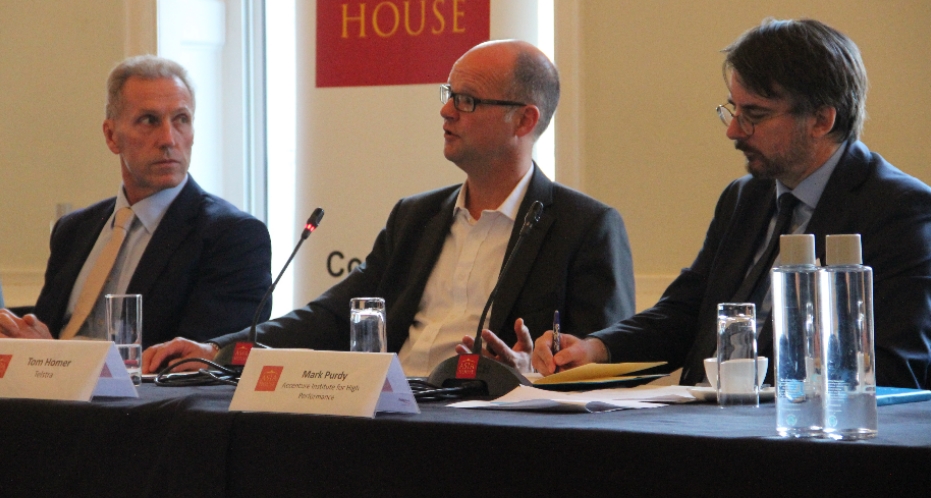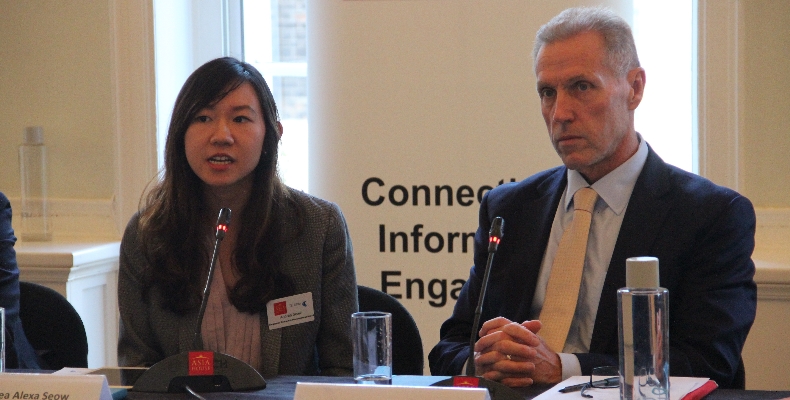Driving commercial and political engagement between Asia, the Middle East and Europe
Driving commercial and political engagement between Asia, the Middle East and Europe
Driving commercial and political engagement between Asia, the Middle East and Europe

Digital technologies could reverse the slump in global trade, according to speakers at a trade and technology event at Asia House.
China’s slowdown as it moves from an export-oriented economy to a consumer-oriented economy, the global fall in commodity prices, together with rising economic nationalism and protectionism across the world, not least in Britain, have all contributed to a sharp fall in global trade in recent years.
However, despite this, there has been a rise in the global trade of services, many of which could be driven by digital technologies, business leaders and professionals were told at a roundtable discussion held in partnership with Telstra titled Technology and global trade – Asia’s sprint ahead.
Speaking at the event on Wednesday 5 October, Mark Purdy, co-author of Accenture report The Growth Game Changer: How the Industrial Internet of Things can drive progress and prosperity, said: “Since 2011 we have seen a marked decline in global trade. Before the financial crisis it grew at 18 per cent and now it is growing at three per cent.”
‘Cusp of a trade renaissance in Asia’
But the rise in global trade of services meant “a greater role for digital technologies in driving trade. We are on the cusp of a trade renaissance in Asia due to the digital revolution,” he said.
Mr Purdy, who is Managing Director and Chief Economist at the Accenture Institute for High Performance, said cross-border Internet traffic has increased 30-fold since 2000. Asia is ripe for growth in digitally-enabled services (such as financial services, insurance, telecommunications, and business, professional, and technical services), he said, since Asian populations already have an affinity with smartphones and the infrastructure and networks are in place.
“120 million people in China have access to mobile Internet,” he stated.
The Internet of Things could improve production and distribution systems, creating more efficient supply chains in Asia, he said.
But there are various challenges too. To move up the value chain to higher-quality production, many companies in Asia, for example in China, will have to upgrade their technological capacity and the proliferation of data protection laws and regulations in Asia presents a challenge to digital business models, Mr Purdy said. Access to the Internet in rural areas is also an issue and partnerships and networks are needed, he stressed.

Andrea Alexa Seow, Centre Director, Singapore Economic Development Bank (left) said Singapore was aiming to become a smart financial centre. She is pictured next to Chief Executive of Asia House Michael Lawrence (right)
Andrea Alexa Seow, Centre Director, Singapore Economic Development Board, said: “ICT is a horizontal enabler across many different sectors in Singapore, namely the financial sector, manufacturing based sector and infrastructure and urban space.”
She said Singapore government agencies planned to “use technology across transport, energy and water and on public housing estates in Singapore to make them sustainable and smart.”
ICT technologies are already being used to improve manufacturing processes in Singapore and FinTech was a big phenomenon too, she said, adding Singapore aimed to become a smart financial centre.
“More than half the Fortune 500 CEOs we talk to are saying their digital businesses are going to double,” said Tom Homer, Head of EMEA at Australian communications company Telstra.
“Asia is much more advanced than Europe in terms of digital partnerships,” he said. “In China 50 per cent of people I talk to are partnering with start-ups. It’s become like a team sport. We need to get better at partnering with digital businesses. They allow you to specialise and to compete on a global stage. It’s about bringing innovation to bigger markets. In the last two or three years Telstra has invested in about 30 interesting digital businesses,” he added.
Brexit
On the topic of Brexit, Mr Homer had mixed views. “Brexit won’t help businesses in the UK partner across Europe. We need to broker those deals as quickly as possible. But in our business at Telstra, because we are in the infrastructure space, we will probably benefit from the rise of economic nationalism,” he said.
Mr Purdy agreed Brexit was not good for trade. But he said that was not so much because of the tariff issue, which he said was overplayed as tariffs were not that high, but because of the level playing field. “A lot of MNCs have a geographic footprint,” he said.
“But we don’t yet know what Brexit will look like,” he added.
Telstra has recently published a report titled Disruption, Digital Transformation and Effective Technology Strategy which details the level of digital disruption in Asia and which sectors and countries are most exposed, business digital transformation strategies and technology initiatives being used in the region.
naomi.canton@asiahouse.co.uk
To give insights into how the City of London could retain its unique post-Brexit status, Chief Executive Officer of Lloyd’s Inga Beale will join Asia House corporate members for a private briefing on Friday, 7 October. For more information click here.
Asia House is holding a series of events to help members navigate the political and economic uncertainties surrounding Brexit. For more information on the Asia House Brexit Series click here.
To find out about becoming a corporate member of Asia House email Charlie.Humphreys@asiahouse.co.uk
